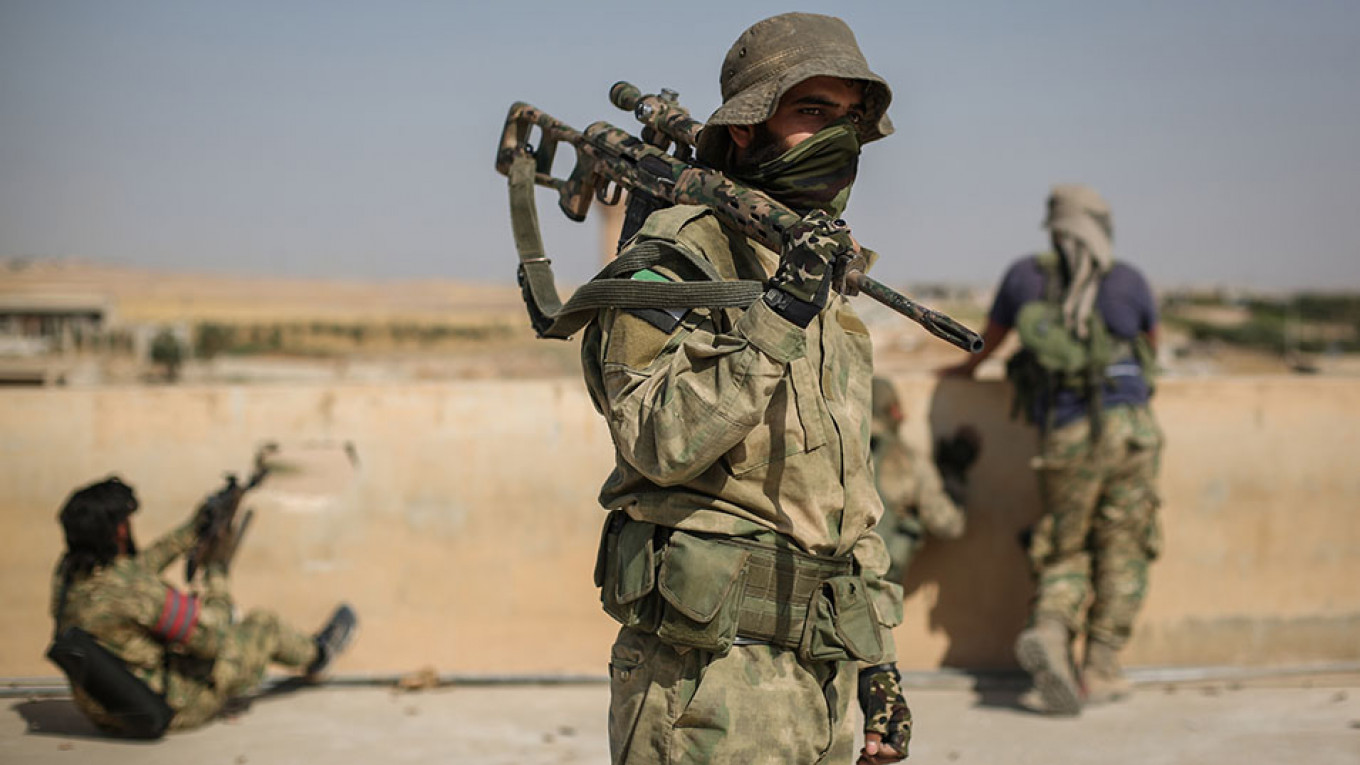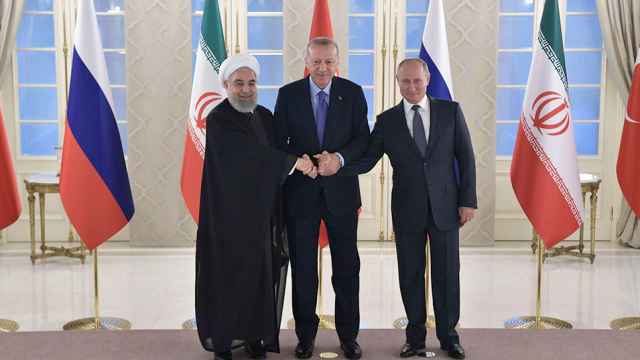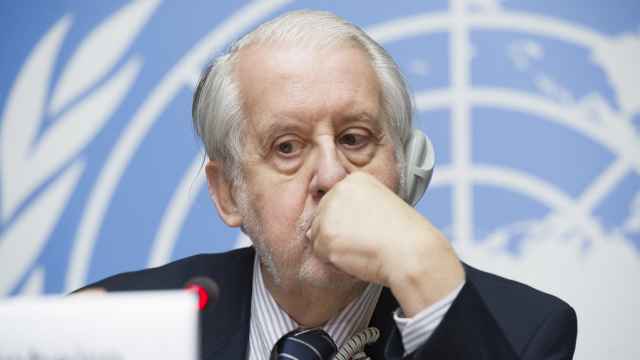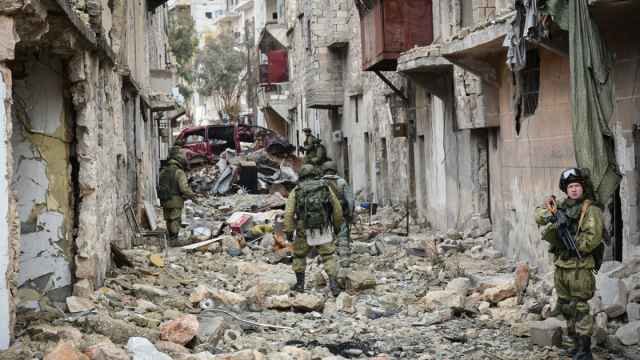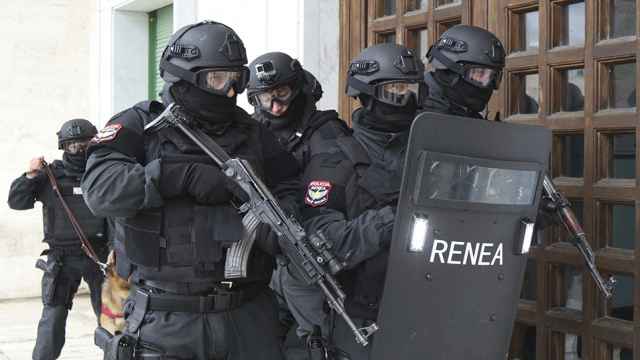Depending on how far Turkey will go into northeastern Syria and how long it will spend there, Russia’s interests in the region might get hurt. But the Kremlin’s position on the military offensive that Turkey is now waging against the Kurdish-led forces, including the Syrian Democratic Forces (SDF), a U.S. ally, has been generally approving.
Moscow seems to be confident that it will be able to defend its red lines in Syria. Russia and Turkey do not agree on everything but they seem to be willing to allow each other a free hand to act in their respective interests, within certain limits.
In a telephone conversation last Wednesday, Russian President Vladimir Putin urged his increasingly close partner President Tayyip Erdogan “not to damage the overall efforts to resolve the Syrian crisis.” “Both sides reaffirmed the importance of ensuring the territorial integrity of Syria,” the Kremlin press service reported, referring to Russia’s and Turkey’s positions.
Russia’s state-run media stress that the Turkish operation has been months in preparation and the incursion is not expected to undermine Russian-led efforts to resolve the Syrian crisis. In Moscow’s view, Turkey was good to go and “provide for its own security” as long as the United States withdrew its backing of the SDF.
It is important for Moscow, though, that all foreign military forces “with illegal presence” should eventually leave Syria, the Kremlin spokesman Dmitry Peskov said. One interpretation of this is that Moscow is ready to condone Ankara’s operation in the region but is not ready to agree to Turkey’s permanent military presence in Syria, a Russian Middle East expert suggested.
Russia’s overarching goal now is to maintain and possibly advance its carefully cultivated role as a preeminent power broker at the world’s most difficult crossroad, the Middle East. So far, Moscow has been successful in attaining recognition of its efforts in the region from players as diverse as Iran, Israel, Jordan, Saudi Arabia, Syria, and Turkey. Most leaders of those countries may not want to sit down for a conversation between themselves, but each of them, separately from the others, is talking to Putin.
Turkey’s operation may put this ambition to the test as the scale of the hostilities might get out of hand, but Ankara is unlikely to jeopardize its relationship with Moscow, which Erdogan himself seems to value highly. Despite their major differences (Crimea alone is a big issue) Russia and Turkey do get along rather well. Shipments of Russian S-400 missile defense systems, a major thorn in the U.S.-Turkey relationship, are complete, but complex equipment like a missile defense system requires long-term training and maintenance programs.
Moscow’s brainchild, the Syrian Constitutional Committee, comprised of members of Assad’s government, the opposition, and Syria’s civil society, is scheduled to convene for the first time at the end of October. “Now that the Syrian Constitutional Committee has been formed and the date for its meeting has been appointed, it is vital to refrain from any steps that may harm the Syrian settlement," Peskov reiterated last Monday.
Unlike the United States, most of the Western world, and Turkey, Russia has been a staunch ally of Syria’s President Bashar al-Assad. Moscow, alongside Iran and its proxies, such as Hezbollah, saved Assad from certain collapse in 2015 and has propped him up ever since. Although no fan of Assad, Erdogan is well aware of Moscow’s priorities in the region and is unlikely to try Putin’s patience too much.
On some important level that has nothing to do with religion, Moscow and Ankara (as well as Damascus, Riyadh, or Tehran) agree: the incumbent is good, regime change is bad. In the Middle East, Moscow has been a consistent backer of incumbents, the journalist Leonid Bershidsky pointed out recently. That alone has afforded Moscow a lot of friends in the region.
It also distinguishes Russia from both the United States of today and Russia in its previous incarnation as the core of the Soviet Union. The U.S.S.R. often propped up revolutionary leftist and otherwise revisionist forces in the Middle East, whereas Putin’s Russia supports the status quo. Libya might sound like an exception, but Russia’s apparent support for the Libyan military commander Khalifa Haftar is a special case because, in Putin’s view, Libya does not have a legitimate government. The demise of Libya’s long-time dictator, Muammar Gaddafi, in 2011 was a pivotal event that has contributed to Putin’s decision to step up Russia’s game in the Middle East.
There is one sphere in which Putin’s Russia is no different from most other influential powers, including the United States and members of the EU. Russia does take the threat of terrorism seriously. The issue of ISIS prisoners is as important for Moscow as it is for Washington — or Ankara, for that matter.
Immediately after Turkey began its offensive, SDF commanders, most of them trained and equipped by the United States, made it clear they would no longer focus on fighting ISIS. Watching over ISIS prisoners locked up in Syria was now his “second priority,” General Mazloum Kobani Abdi of the SDF said on Wednesday.
A terrorist backlash in some form or other is clearly a danger now, but Moscow won’t talk about it publicly. “This is still a hypothetical question,” Kremlin spokesman Peskov said in response to a question about ISIS’s possible resurgence. “This kind of development would have highly detrimental consequences. The Kremlin is watching developments very closely,” Peskov concluded.
Moscow’s big expectations prevail. They have to do with further “conquering” the Middle East and driving a wedge between Turkey and the United States, between Turkey and the Kurds. Regardless of the success of Turkey’s military campaign, Russia might end up in a position to be a referee of last resort for Damascus and Ankara as well as for the Kurds and pro-government Syrians.
This must feel exhilarating, Russia’s domestic situation notwithstanding. The Kremlin must feel that it has finally returned to the world stage as a recognized force in international politics.
Russia might feel boring when compared with the excitement of international power politics, but Russia is where most Russians happen to live. Only they have the power to direct Moscow’s attention back home.
Islamic State is a terrorist organization banned in Russia.
This article was originally published by the Wilson Center.
A Message from The Moscow Times:
Dear readers,
We are facing unprecedented challenges. Russia's Prosecutor General's Office has designated The Moscow Times as an "undesirable" organization, criminalizing our work and putting our staff at risk of prosecution. This follows our earlier unjust labeling as a "foreign agent."
These actions are direct attempts to silence independent journalism in Russia. The authorities claim our work "discredits the decisions of the Russian leadership." We see things differently: we strive to provide accurate, unbiased reporting on Russia.
We, the journalists of The Moscow Times, refuse to be silenced. But to continue our work, we need your help.
Your support, no matter how small, makes a world of difference. If you can, please support us monthly starting from just $2. It's quick to set up, and every contribution makes a significant impact.
By supporting The Moscow Times, you're defending open, independent journalism in the face of repression. Thank you for standing with us.
Remind me later.



